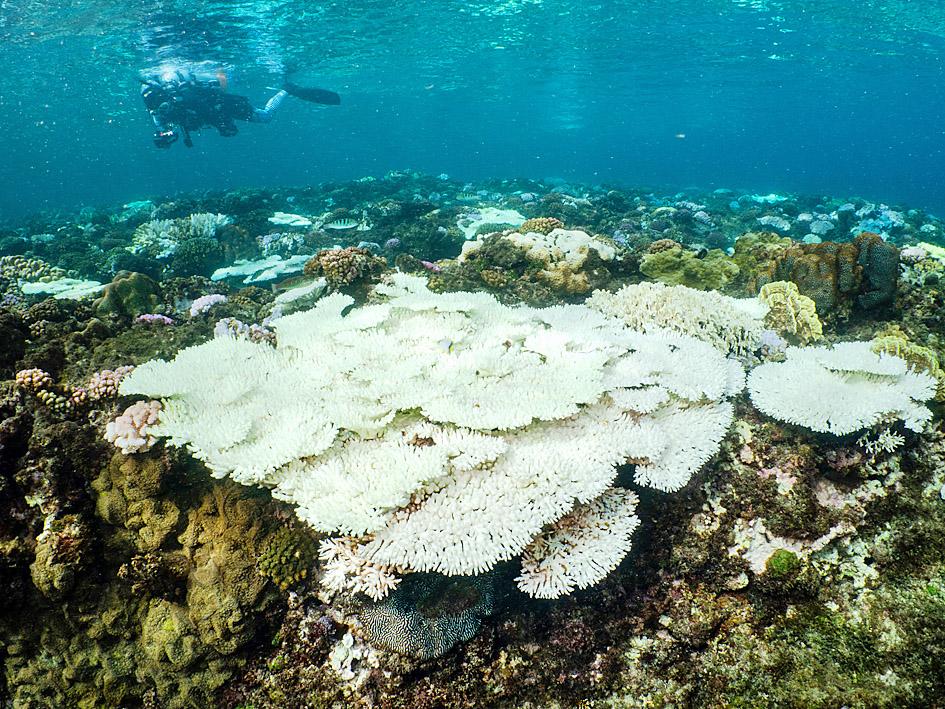At least 31 percent of the coral reefs in waters around Taiwan are dying as a result of bleaching, which is now the worst in its recorded history, researchers from Academia Sinica and the Taiwan Coral Bleaching Observation Network (TCBON) said yesterday, echoing warnings first delivered in September.
The network said that 52 percent of the coral in the nation’s waters is under different levels of heat stress, while 31 percent is in an irreversible process of dying due to high water temperatures.
The coral reefs would not recover, even if the water temperatures fall, said Kuo Chao-yang (郭兆揚), a postdoctoral research associate at Academia Sinica’s Biodiversity Research Center and a TCBON member.

Photo: CNA
The coral bleaching, the worst since the government began keeping such records in the 1980s, was a result of global warming and a low incidence of typhoons in the country last summer, he said.
Average sea temperatures around the nation last year rose to the highest in two decades, Kuo said, citing an average 30.5°C in waters off the north coast last summer, about 1°C above normal.
The optimal water temperature for coral growth is 18°C to 29°C, and in unfavorable conditions, most corals expel their symbiotic algae, causing bleaching or even death, Kuo said.
The areas around Taiwan where the worst bleaching occurred last year were Liouciou Island (琉球), Kenting, the northeast coast, Penghu and Green Island (綠島), he said.
Mingo Lee (李世明), a diver who helps document the condition of Taiwan’s coral, said the underwater temperature near uninhabited Siji Island (西吉) in Penghu County was about 34°C when he dove there last year.
“It was white everywhere, like snow,” he said, describing the coral. “I had never seen anything like that in my 20 years as a diver.”
The massive coral bleaching in Taiwan is worrisome because it threatens biodiversity, said Allen Chen (陳昭倫), an Academia Sinica researcher and one of the founders of TCBON.
Chen said a more aggressive approach to reducing greenhouse gas emissions is needed.
If carbon emissions could be halved by 2030 to 2016’s level, carbon neutrality might be achieved by 2050, he said.
As a result, global warming would be limited to 1.5°C, which would save 30 percent of coral reefs worldwide, he said.
Greenpeace Taiwan has said that coral reef communities around Taiwan make up less than one-1,000th of the world’s in terms of scale, but they account for one-third of the various species globally.
Of the 700 species of stony corals worldwide, 250 can be found along the coast of Taiwan, it said.
Greenpeace Taiwan on Sept. 10 last year said that the coral bleaching in the waters off Kenting was the worst it had seen since 1998, while on Oct. 8, Biodiversity Research Center researchers told a Taipei news conference that last year saw the most severe and extensive coral bleaching since Academia Sinica began monitoring the nation’s near-coast reefs in 2012.
Greenpeace Taiwan representatives told the news conference that local governments should declare a “climate emergency” to help save the nation’s coral reefs.

Tropical Storm Gaemi strengthened into a typhoon at 2pm yesterday, and could make landfall in Yilan County tomorrow, the Central Weather Administration (CWA) said yesterday. The agency was scheduled to issue a sea warning at 11:30pm yesterday, and could issue a land warning later today. Gaemi was moving north-northwest at 4kph, carrying maximum sustained winds near its center of up to 118.8kph and gusts of 154.8kph. The circumference is forecast to reach eastern Taiwan tomorrow morning, with the center making landfall in Yilan County later that night before departing from the north coast, CWA weather forecaster Kuan Shin-ping (官欣平) said yesterday. Uncertainty remains and

SEA WARNING LIKELY: The storm, named Gaemi, could become a moderate typhoon on Wednesday or Thursday, with the Taipei City Government preparing for flooding A tropical depression east of the Philippines developed into a tropical storm named Gaemi at 2pm yesterday, and was moving toward eastern Taiwan, the Central Weather Administration (CWA) said. Gaemi could begin to affect Taiwan proper on Tuesday, lasting until Friday, and could develop into a moderate typhoon on Wednesday or Thursday, it said. A sea warning for Gaemi could be issued as early as Tuesday morning, it added. Gaemi, the third tropical storm in the Pacific Ocean this typhoon season, is projected to begin moving northwest today, and be closest to Taiwan on Wednesday or Thursday, the agency said. Today, there would likely

DISRUPTIONS: The high-speed rail is to operate as normal, while several airlines either canceled flights or announced early departures or late arrivals Schools and offices in 15 cities and counties are to be closed today due to Typhoon Gaemi, local governments announced last night. The 15 are: Taipei, New Taipei City, Taoyuan, Tainan, Keelung, Hsinchu and Kaohsiung, as well as Yilan, Hualien, Hsinchu, Miaoli, Chiayi, Pingtung, Penghu and Lienchiang counties. People should brace for torrential rainfall brought by the storm, with its center forecast to make landfall on the east coast between tonight and tomorrow morning, the Central Weather Administration (CWA) said. The agency issued a sea warning for the typhoon at 11:30pm on Monday, followed by a land warning at 11:30am yesterday. As of

CASUALTY: A 70-year-old woman was killed by a falling tree in Kaohsiung as the premier warned all government agencies to remain on high alert for the next 24 hours Schools and offices nationwide are to be closed for a second day today as Typhoon Gaemi crosses over the nation, bringing torrential rain and whipping winds. Gaemi was forecast to make landfall late last night. From Tuesday night, its outer band brought substantial rainfall and strong winds to the nation. As of 6:15pm last night, the typhoon’s center was 20km southeast of Hualien County, Central Weather Administration (CWA) data showed. It was moving at 19kph and had a radius of 250km. As of 3pm yesterday, one woman had died, while 58 people were injured, the Central Emergency Operation Center said. The 70-year-old